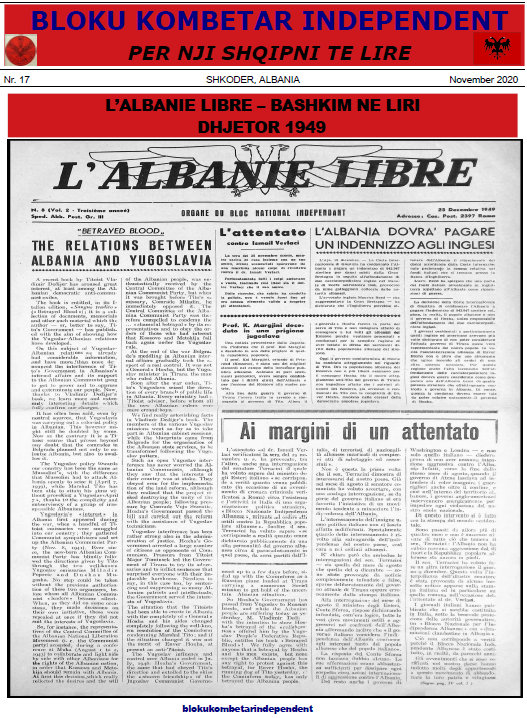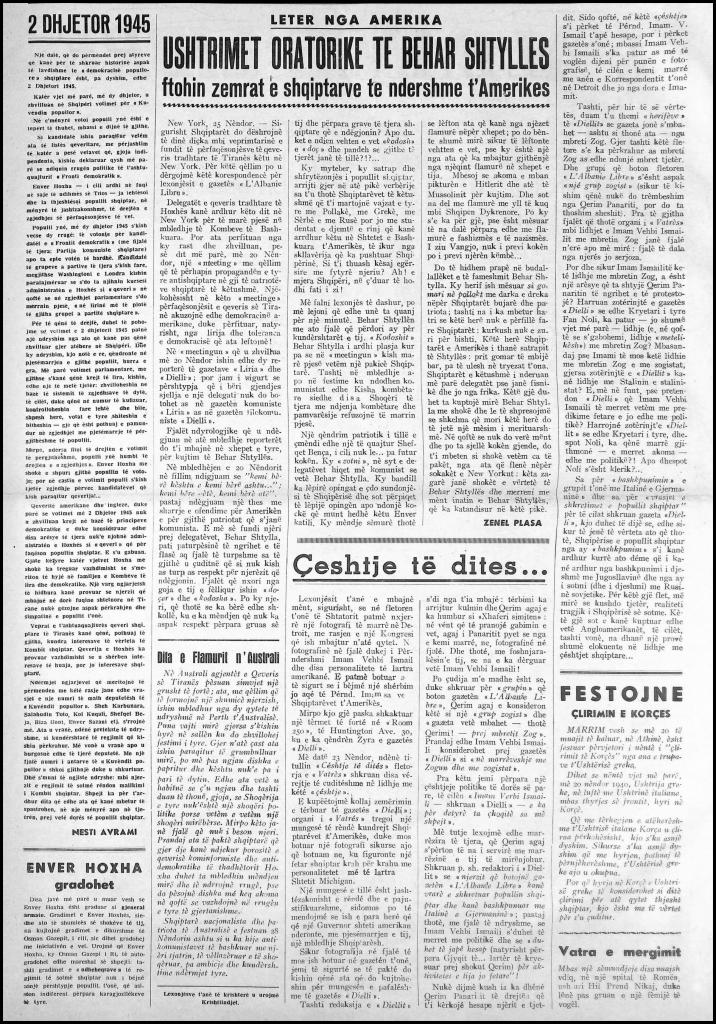
“BETRAYED BLOOD”
THE RELATIONS BETWEEN ALBANIA AND YUGOSLAVIA
A recent book by Titoist Vladimir Dedijer has aroused great interest, at least among the Albanian democratic anti-communist exiles.
The book is titled, in its Italian edition, “Sangue tradito” (Betrayed Blood); it is a collection of documents, memorials and other such material which the author, or better to say Tito’s government, has published with the aim of showing how the Yugoslav-Albanian relations have developed.
On this subject of Yugoslav-Albanian relations we already had considerable information, and have more than once denounced the interference of Tito’s government in Albanian’s internal affairs and its support to the Albanian Communist gang to get to power and to oppress and exterminate our people. Now, thanks to Vladimir Dedijer’s book, we learn more and extremely interesting details which fully confirm our charges.
It has often been said, even by neutral sources, that Yugoslavia was carrying out a colonial policy in Albania. This however might still be doubted by some. Now, on the contrary, it is a Titoist source that proves beyond any doubt that the comrades in Belgrade planned not only to colonize Albania, but also to swallow it.
The Yugoslav policy towards our country has been the same as Mussolini’s, with the difference that Mussolini had to attack Albania openly to seize it (April 7, 1939), while Marshal Tito has been able to attain his aims without provoking a Yugoslav “April 7”, thanks to the complicity and subserviency of a group of irresponsible Albanians.
Yugoslavia’s “interest” in Albania first appeared during the war, when a handful of Titoist emissaries were smuggled into our country; they gathered Communist sympathizers and set up the Albanian Communist Party (Nov. 8, 1941). Ever since, the new-born Albanian Communist Party has blindly followed the directions given by Tito through the two well-known Yugoslav emissaries Miladin Popovic and Dushan Mugosha. No step could be taken without the previous authorization of these two organizers, before whom all Albanian Communist “leaders” became silent. When, as they did on some occasions, made decisions on their own initiative, these were repealed at once if they did not suit the interests of Yugoslavia.
So, for instance, the representatives of the Central Committee of the Albanian National Liberation Movement (i.e. the Communist Party) accepted, during a conference at Muka (August 1 to 2, 1943) to collaborate and fight side by side with other Albanians for the rights of the Albanian nation, in order that Kosovo and Metohija should remain with Albania. At first this decision, which really reflected the desires and the will of the Albanian people, was enthusiastically received by the Central Committee of the Albanian Communist Party, but when it was brought before Tito’s emissary, Comrade Miladin, he immediately opposed it. The Central Committee of the Albanian Communist Party was therefore compelled to condemn the “shameful betrayal” by its representatives and to obey the orders of those who had interest that Kosovo and Metohija fall back again under the Yugoslav rule.
At the end of the war Belgrade’s meddling in Albanian internal affairs gradually took the aspect of a real control. It was not “General” Hoxha, but the Yugoslav minster in Tirana the man who ruled Albania.
Soon after the war ended, Tito’s Yugoslavs seized the direction of every branch of public life in Albania. Every ministry had a Titoist adviser, before whom all the new Albanian rulers were mere errand boys.
We find really astonishing facts in Vladimir Dedijer’s book. The members of the various Yugoslav missions went as far as to take part in Albanian cabinet sessions, while the blueprints came from Belgrade for the organization of the Albanian state services, to be transformed following the Yugoslav pattern.
Such an open Yugoslav interference has never worried the Albanian Communists, although they saw that the interests of their country was at stake. They obeyed even for the implementation of the land reform, although they realized that the project risked destroying the unity of the Albanian people; following pressure by Comrade Vojo Srzentic, Hoxha’s Government passed the bill and carried out the reform with the assistance of Yugoslav technicians.
Yugoslav interference has been rather strong also in the administration of justice. Hoxha’s Government arrested a large number of citizens as opponents of Communism. Pressure from Titoist Major Tominsek led the Government of Tirana to try its adversaries and to inflict sentences that surprised everyone with their implacable harshness. Needless to say, in this too, by sentencing and suppressing so many Albanian patriots and intellectuals, the Government served the interests of Yugoslavia.
The situation that the Titoists had been able to create in Albania with the complicity of “General” Hoxha and his aides changed completely following the well-known resolution of the Cominform condemning Marshal Tito; and if the situation changed it was not the merit of Enver Hoxha, at present an anti-Titoist.
The Yugoslav influence and control over Albania ended in July 1948. Hoxha’s Government, the same that had obeyed Tito’s direction and extolled to the skies “sincere friendship” of the Yugoslav Communist Government up to a few days before, sided up with the Cominform as a Russian plane landed in Tirana carrying a numerous Soviet mission to get hold of the uncertain Albanian situation.
So Hoxha’s Government has passed from Yugoslav to Russian hands, and while the Albanian people are suffering today as yesterday, M. Vladimir Dedija with the intention to show Hoxha’s betrayal of the “collaboration” offered him by the Yugoslav People’s Federative Republic, entitles his book “Betrayed Blood”! We fully agree with anyone that a betrayal by Hoxha and his men exists, but none except the Albanian people has any right to protest against this betrayal, for Enver Hoxha, the running dog of Tito yesterday and of the Cominform today, has only betrayed the Albanian people.




